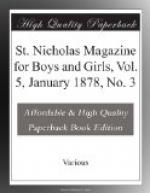Mr. Devins’s first attack on the stubborn forest had been over the brow of the hill, some four miles nearer Owenton, but his house was burned down before he had taken his family there from Albany. He had regretted that he had not “pitched his tent” on the slope of Otter Creek; so now he began with renewed energy his second home, in which the closing in of the winter of 1839 found him. He had sixty acres of rich soil under cultivation at the time of which we are to speak, his right-hand man being his son Allan,—a rugged, handsome, intelligent boy of sixteen.
The winter of ’39 was a terrible one; snow set in before the end of November, and, even in the open country, lay upon the ground until the beginning of April, while in the recesses of the forest it was found as late as the middle of June. There was great distress among the settlers outside of the bounds of civilization, to whom the deep snow was an impassable barrier. The Devinses neither saw nor heard from their nearest neighbors from the first of December till near the beginning of February, when a crust was formed upon the snow sufficiently firm to bear the weight of a man, and a friendly Cayuga Indian brought them news of how badly their neighbors fared.
Mr. Devins was especially touched by the bad case of his friend Will Inman, who lived on the nearest farm. The poor man lay ill of a fever; Mrs. Inman was dead and temporarily buried, until her body could be removed to the cemetery in Owenton, and all the care of the family devolved upon Esther, his daughter, fourteen years old. After a short consultation, the next morning breaking bright and clear though very cold, it was determined to allow Allan to go over the hill to Inman’s, bearing medicine, tea, and other little necessaries for the family. He was impressively warned to begin his return at so early an hour that he might reach home before the short day’s end, especially because of the danger from wild animals. The severity of the winter had made the wolves more venturesome and dangerous than they had been for many years. Mr. Devins had lost several sheep and hogs, and deemed it unsafe for any of his family to be caught far from the house at night.
Allan armed himself with his light rifle, put some biscuits and cold meat in a pouch strapped to his waist, mounted one of the strong farm-horses, and set out on his journey. The road through the forest was better than he expected to find it, as the snow had been drifted off, but at the turns, and in the thickest part of the wood, his horse floundered through drifts more than breast high; and more than once Allan had to dismount and beat a path ahead. Therefore, he did not reach Inman’s till two o’clock, and, by the time he had helped Esther about her work, assisted her young brother to get in a good supply of wood, and made things more comfortable for the invalid, it was almost sundown. He stoutly refused to wait for supper, declaring that the luncheon still in his pouch would serve, and started just as the short twilight came on. He was a brave lad, and, with no thought of peril, went off, kissing his hand gayly to Esther.




